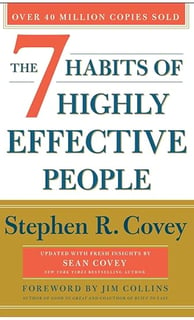Watch Your Habits, for They Become Your Character
ARTICLE
ChatGPT-3.5
3/30/20243 min read


The 7 Habits of Highly Effective People by Stephen R. Covey is a self-help book that has become a cornerstone in the field of personal development since its publication in 1989. It offers a holistic approach to personal and professional effectiveness, focusing on principles that Covey believed were fundamental to success in any endeavor. The book is divided into seven habits, which Covey outlined as follows.
Be Proactive. Covey introduced the concept of proactivity as the foundation of personal effectiveness. He emphasized the importance of taking responsibility for one's own life, rather than being reactive to external circumstances. Being proactive means recognizing that we have the power to choose our responses to any situation, regardless of the stimuli we encounter. In today's world, where uncertainty and change are constant, the ability to be proactive is crucial for navigating challenges and achieving goals.
Begin with the End in Mind. This habit encourages readers to clarify their values and establish clear goals based on those values. Covey suggested that by envisioning the desired outcomes before beginning any endeavor, individuals can align their actions with their long-term objectives. In a society driven by instant gratification and short-term thinking, this habit reminds us of the importance of having a clear sense of purpose and direction in both our personal and professional lives.
Put First Things First. Building on the previous habit, Covey emphasized the importance of prioritizing tasks based on their importance rather than their urgency. He introduced the “Time Management Matrix,” which categorizes activities into four quadrants based on their urgency and importance. By focusing on activities that are important but not necessarily urgent, individuals can better allocate their time and energy to tasks that align with their goals. In today's fast-paced world, where distractions abound, this habit encourages us to focus on what truly matters and avoid getting caught up in trivial matters.
Think Win-Win. Covey advocated for an abundance mentality, where individuals believe that there is enough success and resources to go around for everyone. This habit encourages collaborative and mutually beneficial relationships, where both parties seek to create solutions that satisfy the interests of all involved. In a competitive world, where zero-sum thinking often prevails, adopting a win-win mindset can lead to more sustainable and fulfilling relationships, both personally and professionally.
Seek First to Understand, Then to Be Understood. Covey emphasized the importance of empathic listening, where individuals seek to understand others' perspectives before seeking to be understood themselves. By genuinely listening to others and empathizing with their experiences, individuals can build trust and rapport, leading to more effective communication and problem-solving. In today's polarized society, where communication often breaks down due to lack of understanding and empathy, this habit reminds us of the importance of active listening and genuine connection.
Synergize. Covey introduced the concept of synergy, where the whole is greater than the sum of its parts. By leveraging the strengths and perspectives of diverse individuals, teams can achieve outcomes that surpass what any single individual could accomplish alone. This habit encourages collaboration, creativity, and innovation, fostering environments where everyone's contributions are valued and integrated for collective success. In today's interconnected world, where collaboration across boundaries is increasingly necessary, this habit highlights the power of synergy in driving meaningful change.
Sharpen the Saw. The final habit focuses on self-renewal and continuous improvement. Covey used the metaphor of sharpening the saw to illustrate the importance of investing in personal growth and development across four dimensions: physical, mental, emotional, and spiritual. By prioritizing self-care and lifelong learning, individuals can sustain their effectiveness over the long term and lead more fulfilling lives. In a society that often glorifies busyness and neglects self-care, this habit serves as a reminder of the importance of balance and well-being in achieving lasting success.
Overall, The 7 Habits of Highly Effective People offers a timeless framework for personal and professional effectiveness that remains relevant in today's rapidly changing world. By focusing on principles such as proactivity, goal-setting, collaboration, and self-renewal, Covey provided readers with actionable strategies for navigating challenges, building meaningful relationships, and achieving their highest potential. Whether in the workplace, at home, or in the community, the principles outlined in this book serve as a roadmap for success and fulfillment in all aspects of life..
—This article was partially generated by ChatGPT (powered by OpenAI’s language model, GPT-3.5; https://openai.com). The editing was performed by Aaron Larson.
Purchase the book now on Amazon
As an Amazon Associate, I earn from qualifying purchases. This does not affect your cost. The commission comes out of Amazon's profits. Thank you for your support.


